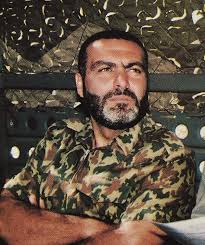In these days, when Armenia and Artsakh are fighting off Azerbaijani-Turkish attacks, it is timely to remember the name of one of the heroes of the first war of Artsakh and founder of the armed forces of Armenia.
Vazgen Sargsian was born on March 5, 1959 in the village of Ararat, Armenia. After graduating from the village’s middle school, he attended the Armenian State Institute of Physical Culture and Sport in 1976-79. In 1979-83, he served as physical education teacher at the middle school of Ararat, thus being exempted from mandatory military service.
His literary activity began early on. He joined the Union of Writers of Armenia in 1985, and in 1986-89 he ran the social commentary section of the “Garun” monthly review. His first volume of short stories, “The temptation of bread,” was published in 1986. He has also written many general interest articles, but his literary pursuits ended in the late 1980s.
As an active member of the Artsakh movement, Sargsian was a commander of volunteers’ detachments in 1989-90 near Yeraskh, on the Armenian-Azerbaijan border with Nakhichevan. In 1990, as a leader of the Pan-Armenian National Movement, he was elected a representative of the National Assembly, where he chaired the defense and interior committees. The “Yerkrapah” volunteer units, created upon his initiative, became the foundations for the Armenian Army.
In December 1991 he was named minister of Defense of Armenia. A month later he set out to create the Armenian armed forces. In May-June 1992, following the liberation of Shushi and Berdzor (Lachin), Sargsian proposed the creation of the “Ardziv mahapartner” commandos, which achieved victories in August-September 1992 in Martakert that changed the course of the war.
In October 1992-March 1993, he served as presidential advisor for defense and special representative of the president of Armenia in border areas, following which he was named minister of defense, national security and the interior of Armenia. Sargsian played a major role in the organization of the Armenian army and, along with the other top commanders, he has led the military operations in Artsakh until the ceasefire of May 1994. In 1993, he created the “Yerkrapah” volunteer movement, which played a pivotal role in Armenian politics.
In July 1995, Vazgen Sargsyan was appointed minister of Defense by President Levon Ter Petrossian, holding that position for four years, during which he continued thorough work to complete the organization of the army. He became one of the main political figures of Armenia in the postwar period, playing a major role in the presidential elections in 1996. As he opposed Ter Petrossian’s concessions to solve the conflict of Artsakh, Vazgen Sargsian, with support from Prime Minister Robert Kocharian and Interior minister Serzh Sargsian, demanded the resignation of President Ter Petrossian in February 1998. Shortly after, in March 1998, V. Sargsian supported the election of Kocharian as president. The “Yerkrapah” movement gained a majority in the National Assembly, helping him consolidate his political influence, an in 1998 he joined the Republican Party of Armenia.
In March 1999, Vazgen Sargsian’s Republican Party formed a coalition with the Popular Party of Karen Demirjian, which became known as “Unity.” This coalition won the elections in May. In June 1999, Sargsian was appointed Prime Minister while Demirjian was named National Assembly speaker. His political influence grew further, eclipsing President Kocharian. During Sargsian’s short tenure as prime minister the Pan-Armenian games took place as well as the first Armenia-Diaspora Congress.
Sargsian, Demirjian, five lawmakers and a minister were assassinated on October 27, 1999 by an armed group led by Nayiri Hunanian, which took the National Assembly building by assault. The attackers have been condemned to life in prison. Yet the circumstances surrounding the attack have never been fully explained and there are a number of versions about the motivations of these political assassinations and the forces behind it.
Notwithstanding criticism against him, Vazgen Sargsian is recognized by the government and the public as a national hero. He has been proclaimed national hero of Armenia and hero of Artsakh. The military academy of Yerevan is named after Sargsian, as well as the republic’s stadium, a central street and a street in Stepanakert, in addition to a park in Kapan. His statues have been erected in a number of cities and there is a museum dedicated to him in his hometown, the village of Ararat.
